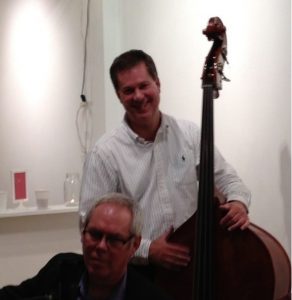This month’s Musician’s Musings was written by BSO board member and associate principal violist, Sarah Oxendale
I didn’t find music; music found me.
As a young girl growing up in the northern suburbs of the Twin Cities, I had no knowledge of classical music. I had no family members that were musicians, and in our neighborhood, few families were able to afford music lessons for their children. Playing an instrument had never crossed my mind, until I was 11 years old and I had the chance to get out of reading class.
One day in fifth grade, Mrs. Wilson visited our classroom. She brought along a violin and played a few songs that most of us could recognize: Twinkle, Twinkle Little Star, Row Your Boat, and other childhood songs. She also played music I had never heard before, but instantly I was fascinated by the sound of the violin, with soaring melodies and sparkling notes. Mrs. Wilson handed out paper and asked us to trace our left hand with a crayon. Then, one by one, she looked at each student’s hand drawing and asked them if they would be interested in learning an instrument. When Mrs. Wilson saw my hand, she exclaimed at my long fingers and said “You can play any instrument you want to! Would you like to try the string bass?” I shook my head no- the violin had found me. Orchestra class was once a week during reading class, and although I loved reading, I loved doing things with my friends even more. A few of my friends signed up for orchestra, and I went home and told my parents I wanted to play the violin.
Many things attracted me to the violin. I, of course, loved the sparkling and dazzling sound of the instrument. I also loved the look of the instrument- carved out of wood and lacquered a beautiful orange-brown color. Most of all, I was drawn to the process of learning how to play the instrument. I loved the tactile experience of holding the violin in the left hand and the bow in the right, and learning how to coordinate the movements to produce a sound (although it took some time to learn how to stop squeaking!). Learning how to move the fingers in my left hand with rhythm and precision took a lot of practice, and I found myself, even at a young age, practicing for hours to master each song for orchestra class.
By the time I was 13, I was fully immersed in orchestra. Mrs. Wilson, who had inspired me to begin violin, recommended to my parents that I take private lessons. I did, and with the help of my teacher, I successfully auditioned to join the Greater Twin Cities Youth Symphonies. There I got my first experience with “real” classical music. In the symphony, we played entire pieces instead of short excerpts, and we had a full orchestra including winds, brass, and percussion instead of my school string-only orchestra. Yet I still didn’t love classical music. As I told my mom, I loved playing classical music but I didn’t like listening to it.
When I entered high school, my musical world broadened. I began studying privately with a new teacher, Lynda Bradley-Vacco. My high school had many opportunities for musicians outside of regular orchestra class, including chamber orchestra, pit orchestra with the musical theater, and all-conference and all-state orchestra groups that I joined by audition. It wasn’t until I was playing music several hours a day, several days a week that classical music found me- I finally began to understand and appreciate classical music. I learned to hear how music evolved with history, from the sturdy Baroque sounds of Handel and Bach to the passionate sounds of Debussy to the unusual and even strange sounds of 20th century music. I began listening to classical music constantly and for me it became an outlet for expression, a respite from stress and worry, and a reflection of joy and happiness. I learned how to apply my musical skills to bring expression and personality to the music. Around this time I also learned that I loved something even more than the violin- the viola! Compared to the violin, the viola is slightly bigger, with a lower range, a deeper sound, and more richness and depth. There are fewer sparkling, dancing melodies, but more interesting harmonies and beautiful singing tones that spoke to my quiet personality more than the flashy, center of attention violin. With the support of my teacher Lynda (who was primarily a violist herself), I began to learn the viola and decided to switch exclusively to viola when I began college.
Inspired by my teachers, I decided to pursue a degree in music education, hoping to become an orchestra teacher myself. However, as I began to take education curriculum courses, I realized that my love of music did not include a love of teaching. I began to explore other career options outside of music, and I discovered occupational therapy. Occupational therapists are healthcare professionals that work in the rehabilitation process, helping people with disabilities or injuries to gain or regain skills that they need to function in daily life. My particular interest area was hand therapy; this is a specialty of occupational therapy that helps people recover from injuries and surgeries of the shoulder, elbow, wrist, and hand. From my experience as a violinist, learning how to teach my hands to work and refine skills to play an instrument, I knew that I would love helping others with rehabilitating their hands to be able to do the things they love to do. I learned that some hand therapists specialize in working with musicians and treating musician injuries, and I was fortunate enough as an OT student to do a clinical internship with the musician’s clinic at Sister Kenney Rehabilitation in Minneapolis (now a part of Courage Kenney Sports and Physical Therapy).
After graduating with my Doctorate in Occupational Therapy in 2008, I began working full time as a hand therapist. Unfortunately, during my studies I had put my viola aside, as I did not have opportunities or time to play my instrument. Classical music was still an important part of my life and I missed my viola, but my passion for my career, and then my family, came first.
Then, music found me again. In 2013, I had stopped working and was a stay-at-home parent to my infant twin daughters. Lynda Bradley-Vacco, my former teacher, sent me a Facebook message one day and asked me if I’d like to play viola with the orchestra she was leading, the Bethel University Orchestra. I jumped at the chance to start playing and performing music again. I pulled my viola out of storage and dusted it off, and to my surprise it felt easy to play, even after taking a seven year hiatus from playing. My hands remembered what to do; the hours and hours I spent refining my skills paid off as muscle memory. It took a little bit more time to refresh my speed at reading music and understanding rhythms, but I worked hard to gain those skills back to perform with the Bethel Orchestra. Music found me and I felt back at home doing something I loved. Lynda was proud of me for returning to my passion for music, and I was grateful to her for giving me the opportunity and inspiration.
Less than a year after we had reconnected, Lynda tragically died of cancer. For me, and for so many of her former students, the pain we felt could only be expressed in music. Her funeral included music performed by a full string orchestra and honored the gifts of faith, love, and music that Lynda gave each of her students. I decided that reconnecting with her and finding music again had a purpose, and that I wanted to stay involved in music in part to honor her legacy. Years ago, Lynda had played occasionally with the Bloomington Symphony Orchestra and had spoken highly of her musical experience with the group, and I decided that I would audition to join the BSO. I’ve now been a member of the BSO viola section for 3 years and I’m grateful that yet again, music found me.

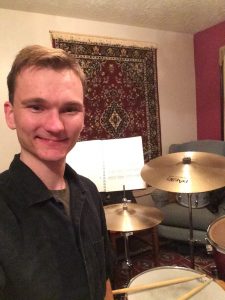
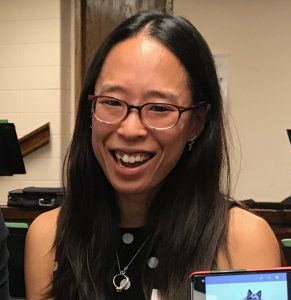 Music has always played an important role in my life. To simply put a complex experience, it has been a constant vehicle of learning and growth. In addition to the music, from an early age, the orchestra helped me learn what it means to be a part of a team, to work hard, to build trust and relationships, and to have fun while doing it! My high school orchestra and teacher made the greatest impacts on my childhood, which inspired the decisions that led to where I am now as an adult.
Music has always played an important role in my life. To simply put a complex experience, it has been a constant vehicle of learning and growth. In addition to the music, from an early age, the orchestra helped me learn what it means to be a part of a team, to work hard, to build trust and relationships, and to have fun while doing it! My high school orchestra and teacher made the greatest impacts on my childhood, which inspired the decisions that led to where I am now as an adult.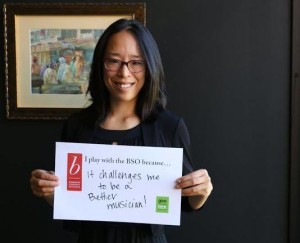
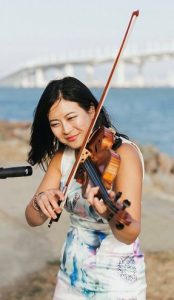 – I had the privilege of sitting next to Rui Du, the assistant concertmaster. I was extremely humbled (and intimidated!) by his talent, but the best part about sitting next to him was getting to know him outside of his profession. We talked about our Asian backgrounds, our families, and how this event was something that he also enjoyed. We also talked about how we are both transplants to Minneapolis and the associated challenges that transplants often face. This ability to empathize with similar issues made me realize that I, Jo Schmoe with a corporate job, am actually not that different from a professional musician.
– I had the privilege of sitting next to Rui Du, the assistant concertmaster. I was extremely humbled (and intimidated!) by his talent, but the best part about sitting next to him was getting to know him outside of his profession. We talked about our Asian backgrounds, our families, and how this event was something that he also enjoyed. We also talked about how we are both transplants to Minneapolis and the associated challenges that transplants often face. This ability to empathize with similar issues made me realize that I, Jo Schmoe with a corporate job, am actually not that different from a professional musician.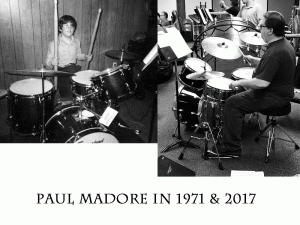
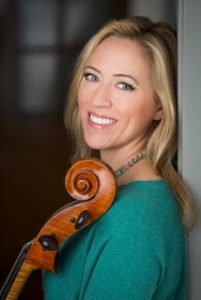 But then 25 years passed, in which I switched from my Music major to Economics, worked in IT, married, and had kids. The aspiration switched from performing at Orchestra Hall to just making time in a busy life to attend the concerts. Then one day last spring I had three people send me the same email – the Minnesota Orchestra was hosting a Fantasy Camp
But then 25 years passed, in which I switched from my Music major to Economics, worked in IT, married, and had kids. The aspiration switched from performing at Orchestra Hall to just making time in a busy life to attend the concerts. Then one day last spring I had three people send me the same email – the Minnesota Orchestra was hosting a Fantasy Camp